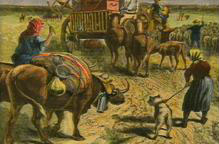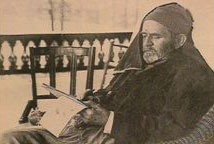Manifest Destiny
The Power of an Idea
by Miguel Ángel González Quiroga
It is said that wars usually begin many years before the first shot is fired. I believe this to be so, and most especially in the case of this war. But how far back do we go? Ten years to the separation of Texas? Twenty-five years to the founding of the Mexican State? I would agree with those who hold that the die was cast when the United States was born as a nation and began its slow but inexorable expansion to the West.
 The westward movement is one of several factors attributed to this war. You've heard them all: the slave interests of the South, the commercial interests of the Northeast, the land hunger of the West, Manifest Destiny, the Warhawks, James K. Polk. For those who blame Mexico: her internal divisions, her inability to colonize and govern the Northern lands, her rampant militarism, her unbounded arrogance.
The westward movement is one of several factors attributed to this war. You've heard them all: the slave interests of the South, the commercial interests of the Northeast, the land hunger of the West, Manifest Destiny, the Warhawks, James K. Polk. For those who blame Mexico: her internal divisions, her inability to colonize and govern the Northern lands, her rampant militarism, her unbounded arrogance.
American expansion, or growth, to use a less belligerent term, was, in my estimation, the principal cause of this great conflict. Without it, the war is simply incomprehensible. We could almost say the expansion was an irreducible brute fact.
Within the overall concept of expansion stands the doctrine of Manifest Destiny, which has an immense fascination for many of us in Mexico. Without pretending to add anything new to what has been said of old, I wish to include a few words on the concept of Manifest Destiny.
It is dangerous to underestimate the power of an idea. Especially one which captures the imagination of a people. Manifest Destiny was such an idea. To extend American democracy to the rest of the continent was to place a mantle of legitimacy on what was essentially an insatiable ambition for land. Some have argued that it was villainy clad in the armor of a righteous cause, to use an expression by Lippman. It is difficult to argue against democracy and its extension to the farthest reaches of the continent although historians have pointed out that, at least in this case, extending the area of freedom also signified extending the area of slavery.
The assertion of the superiority of the American race and the concomitant denigration of Mexico is another element of Manifest Destiny. It was Walt Whitman who stated: "What has miserable, inefficient Mexico—with her superstition, her burlesque upon freedom, her actual tyranny by the few over the many—what has she to do with the great mission of peopling the new world with a noble race? Be it ours, to achieve that mission!"
Those of us who admire Whitman as the greatest of American poets cannot but be disappointed at this stand on the war. Can this be the same poet who glorified equality and the respect for others when he said, "For every atom belonging to me as good belongs to you?" Or when he wrote, "Whoever degrades another degrades me, and whatever is done or said returns again to me?"
How can we reconcile this contradiction? The poet of the body and of the soul himself explained it when he wrote, "I am vast, I contain multitudes."
It is a painful exercise to look in the mirror of our past and discover that we are found wanting. It is sobering to read that we were beaten because we were a backward and decaying people. I cannot think that Mariano Otero and Carlos Maria Bustamante were the products of a decayed race. But we in Mexico cannot and do not ignore the weakness and the underdevelopment which was our lot in the 19th century. Nor do we ignore that underdevelopment was also the product of long and complex historical forces.
 Manifest Destiny was a graceful way to justify something unjustifiable. It has not escaped our attention that Ulysses S. Grant, one of the most prominent of American military men, and himself a participant in the war, wrote in his memoirs, "I do not think there ever was a more wicked war than that waged by the United States in Mexico. I thought so at the time, when I was a youngster, only I had not moral courage enough to resign."
Manifest Destiny was a graceful way to justify something unjustifiable. It has not escaped our attention that Ulysses S. Grant, one of the most prominent of American military men, and himself a participant in the war, wrote in his memoirs, "I do not think there ever was a more wicked war than that waged by the United States in Mexico. I thought so at the time, when I was a youngster, only I had not moral courage enough to resign."
But as a historian I do not wish to judge or to censure. Let me state my own views on the matter: expansion was a historical process that, like a westward wind, swept all before it. Not Mexico, not any force on this continent or any continent could have prevented it. This is not a question of good demographics. European immigration led to an explosive growth of the population of the United States and this inevitably led to expansion. Expansion led to war.






